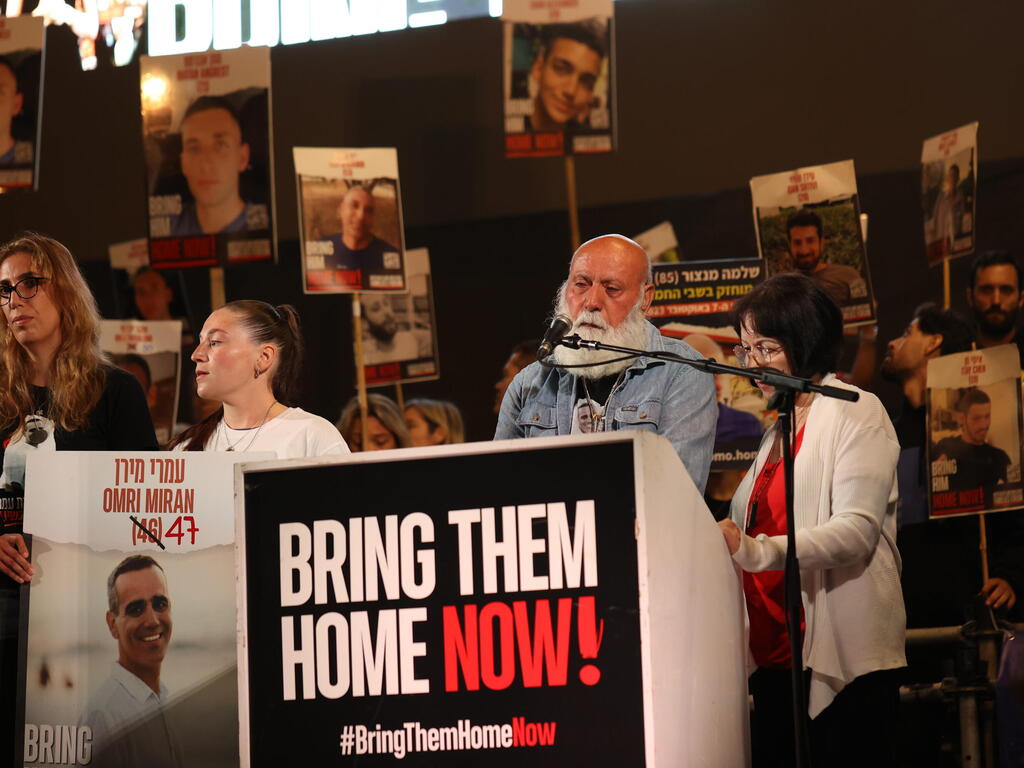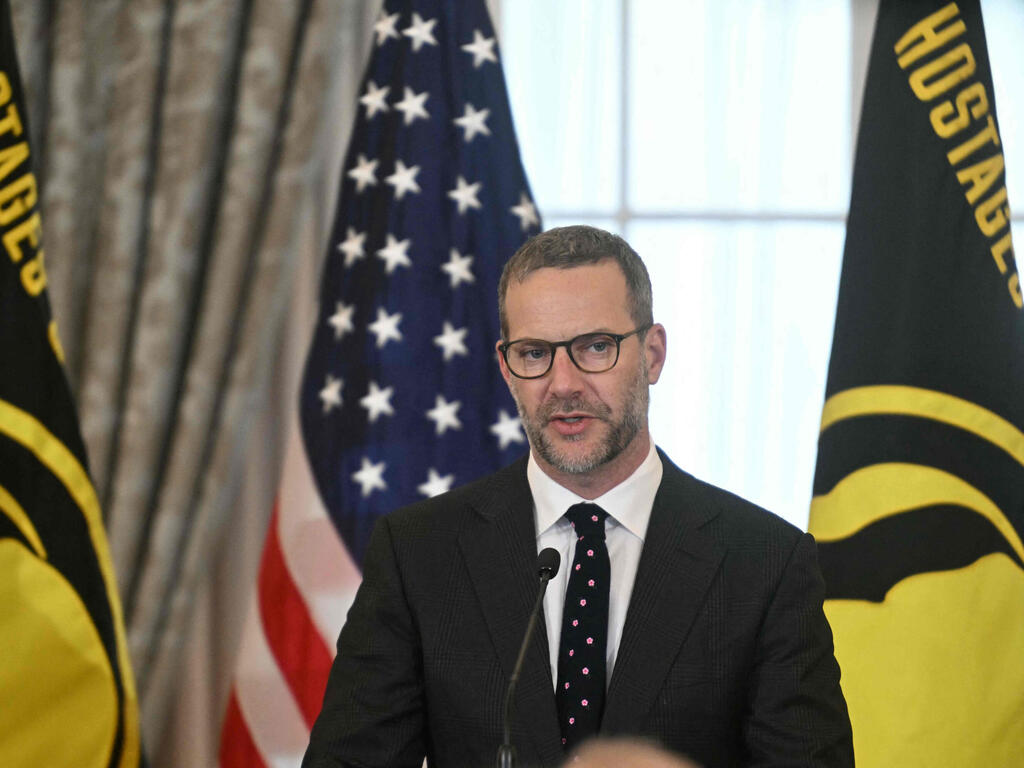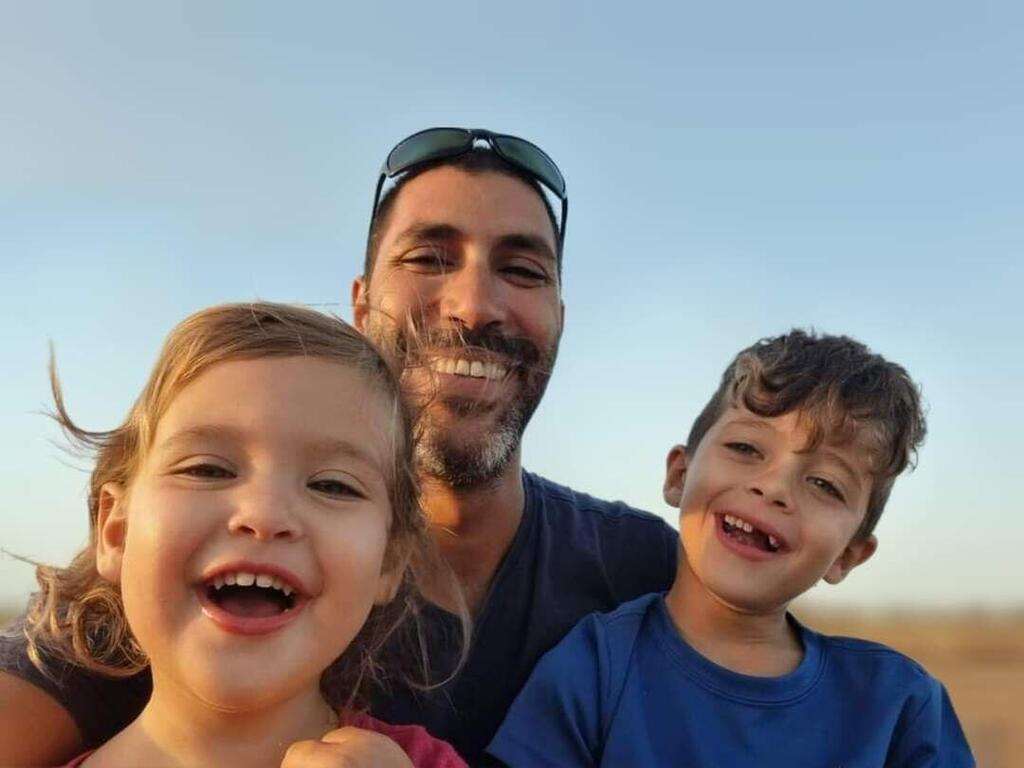The framework for a hostage release deal remains uncertain, with proposals ranging from freeing half of the 59 living and deceased hostages at once to releasing 10 living captives without mention of the fallen.
While U.S. President Donald Trump issued an ultimatum to Hamas demanding the release of all hostages—calling it their "final warning"—negotiations in Doha suggest discussions are focused on freeing a much smaller number.
5 View gallery


Tel Aviv rally calling for the release of the remaining hostages
(Photo: Erez Harodi)
At the beginning of the month, Israel announced its agreement to the framework proposed by U.S. envoy Steve Witkoff.
According to this plan, which was first revealed in an official statement from the Prime Minister’s Office, the first phase would see the release of half of the living and deceased hostages. If an agreement on a permanent cease-fire were reached, the remaining hostages—both living and deceased—would be freed in a later phase. Initially, this meant the release of approximately 11 living hostages and 19 bodies.
Hamas rejects initial proposal, new version on the table
Hamas quickly rejected this plan, leading to a revised proposal, also spearheaded by Witkoff. The updated framework calls for the release of 10 living hostages, including American citizen Idan Alexander and nine others reportedly subjected to torture. While this number is similar to the original plan, there has been little mention in negotiations of the earlier demand to release the bodies of hostages.
Under the current proposal, the cease-fire would be extended through the end of Ramadan and Passover, and Israel would resume humanitarian aid deliveries to Gaza.
Meanwhile, Lebanon’s Al-Akhbar newspaper, which is affiliated with Hezbollah, reported that Egyptian diplomatic sources say the most viable deal under discussion involves the release of 10 living hostages in exchange for a 60-day cease-fire. During this period, large quantities of humanitarian aid would be allowed into Gaza, and hundreds of Palestinian prisoners held in Israeli jails would be freed. The report also claims that to avoid tensions within Israel, the released hostages would not be publicly celebrated or paraded upon their return.
Israel pushes for injured and sick hostages first
Israel's position is that priority should be given to releasing hostages who are injured or ill. Previously, there had been discussions about prioritizing the release of four fathers of young children: David Cunio, Omri Miran, Elkana Buhbout, and Maxim Herkin.
Israeli officials said, “If we see that the Witkoff framework is not viable and no agreement is reached, Israel will seek to extend the first phase or create an interim deal as a bridge to the Witkoff plan.” This would mean multiple release phases in exchange for temporary cease-fire extensions, with the exact number of hostages freed, the timeline, and other details still to be determined.
Get the Ynetnews app on your smartphone: Google Play: https://bit.ly/4eJ37pE | Apple App Store: https://bit.ly/3ZL7iNv
Israel’s negotiating team, led by a senior Shin Bet official, arrived in Doha on Monday. Other members include hostage and missing persons coordinator Gal Hirsch, Prime Minister Benjamin Netanyahu’s foreign policy adviser Ophir Falk, and representatives from Mossad, Shin Bet, and the IDF. Talks resumed after the Ramadan fast-breaking meal (Iftar) and are expected to continue for two days.
Witkoff is expected to arrive in Doha today to push for progress in negotiations. While he is not currently scheduled to visit Israel, it is possible he could do so unexpectedly if necessary to convince Netanyahu to agree to certain aspects of the deal.
U.S. involvement and Hamas’ stance
The negotiations are taking place against the backdrop of direct talks between Hamas and Trump’s special envoy for hostage affairs, Adam Boehler. These talks have drawn criticism in both Israel and the United States. Boehler’s discussions primarily focused on securing the release of Alexander, though four other American citizens—Omer Naotrah, Itai Chen, Judy Weinstein Haggai, and her husband Gadi Haggai (who were killed on October 7)—remain in captivity.
Israeli officials believe Boehler’s talks with senior Hamas leader Khalil al-Hayya have not contributed positively to negotiations, and even White House officials are reportedly dissatisfied with the results. U.S. Secretary of State Marco Rubio said yesterday that the direct talks with Hamas were a “one-time event” and admitted they had not yielded results.
Meanwhile, the London-based Asharq Al-Awsat newspaper reported that Hamas has made clear it has not committed to disarmament under any deal, calling it an “internal Palestinian matter.” According to sources, Hamas told Boehler they would only consider disarming if a clear political path to a Palestinian state were established.
Families of hostages speak out
The slow progress in negotiations has left families of the hostages frustrated. Yael Ader, whose son Tamir Ader was murdered on October 7 while defending Kibbutz Nir Oz, expressed her frustration in an interview with Ynet. His body remains in Gaza.
“They’re talking about a two-month cease-fire for 10 hostages. It feels like they’re telling the families of the fallen: ‘You’re on hold.’ And for the living hostages, they’re playing Solomon’s trial, deciding who is more important or more humanitarian to save,” she said.
Ader added, "I hope someone will stand up and say, ‘We’re bringing all 59 home.’ But I’m also deeply afraid because I see where the government is headed. It doesn’t want to resolve this for reasons tied to other political interests. Right now, it’s the Americans who are the only ones demanding that everyone be released."
“But they’re promising hell, and we’re the only ones who can deliver it,” she added. “They expect us to send our forces into battle. It’s a problematic paradox.”
Referring to Trump’s ultimatum, she noted: “Even Trump, at some point, will say, ‘I said my piece—now Netanyahu has to decide.’ The prime minister must decide that ending this crisis is the most important thing, even if it means not passing the March budget or that his coalition collapses. Bringing the hostages home is what matters most to Israeli society right now.”
Ader also criticized Israel’s handling of the crisis, pointing out that U.S. officials have been more responsive than the Israeli government.
“I have Israeli citizenship—why should I have to turn to the U.S. for help? My son went to defend Israel’s border, not America’s. I’m grateful to the Americans, but the effort should be coming from Israel’s prime minister,” she said.
“Even Witkoff—when I reach out to him, he responds. Israel’s prime minister? Unreachable. Something here doesn’t make sense.”
This report was prepared with contributions from Einav Halabi and Lior Ben Ari.






